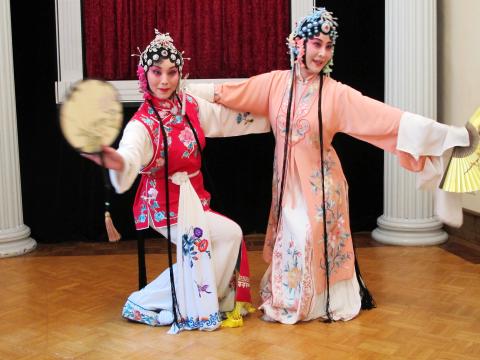One of the founders of the Taiwan Kunqu Opera Theater (台灣崑曲劇團) believes that fortunes may be turning for kun opera.
Earlier this month, theater cofounder Hung Wei-chu (洪惟助) returned from a trip to Austria, visiting Vienna’s University of Music and the Performing Arts and overseeing a performance of highlights from the kun classic The Peony Pavillion at the Palais Palffy in Vienna. This followed a visit to the school of music at Heidelberg University.
The visit included five performers and two academics from Taiwan, and also representatives of the National Academy of Chinese Theater Arts (北京中國戲曲學院) from Beijing.

Photo courtesy of Hung Wei-chu
“There have been many kun performances overseas,” Hung said. “But mostly these have been organized by Chinese communities in various places, particularly the US. In this instance, the invitation was initiated by music academies overseas. With western musical institutions now taking a more active interest in kun, this could see a real change in its fortunes.”
Kun opera is an ancient form of opera, a precursor to the better-known Beijing opera, which suffered a dangerous decline due to its high demands on both performers and audiences, but whose expressive power has won over powerful new advocates in the last two decades.
In a phone interview with Taipei Times soon after his return from this trip, Hung spoke about the current situation of kun opera in Taiwan and China, and his hopes from its international development in the future.
“Kun began its revival in the early 1990s,” Hung said, “And at that time Taiwan was relatively rich, and the situation in China was still chaotic. At that time, some of the best kun opera teachers and performers were eager to visit Taiwan. It was during this period, when Taiwan played host to some of the greatest kun performers of that generation that it developed a discerning audience. Now, top performers are in great demand in China, and salaries are correspondingly high, so it has become more difficult to bring top opera stars over. But the quality of our opera audience is still much appreciated.”
Hung said he had been greatly touched by the intense interest that staff and students in both Austria and Germany had shown during the performances.
“Their enormous respect for the artistry was powerfully conveyed to me,” Hung said, adding that Professor Rudolf Brandl, one of the people behind the invitation to Vienna, had insisted that subtitles not be shown during the performance, as this would prevent the complete focus on the performers.
Hung suggested that the tide was turning for art forms such as kun opera, which might one day have the same kind of appeal as Italian opera. “Our acceptance of Western culture is inevitably conditioned to some degree by economics. The powerful position of Western nations in the economy has helped promote Western art around the world. With China’s rise as an economic force, interest in Asian arts will now grow.”
Hung also suggested that kun opera, with its focus not just on singing, but also on movement, would provide more for a foreign audience to appreciate. “There is so much beauty in kun opera, not just singing,” he said.

May 18 to May 24 Pastor Yang Hsu’s (楊煦) congregation was shocked upon seeing the land he chose to build his orphanage. It was surrounded by mountains on three sides, and the only way to access it was to cross a river by foot. The soil was poor due to runoff, and large rocks strewn across the plot prevented much from growing. In addition, there was no running water or electricity. But it was all Yang could afford. He and his Indigenous Atayal wife Lin Feng-ying (林鳳英) had already been caring for 24 orphans in their home, and they were in

On May 2, Chinese Nationalist Party (KMT) Chairman Eric Chu (朱立倫), at a meeting in support of Taipei city councilors at party headquarters, compared President William Lai (賴清德) to Hitler. Chu claimed that unlike any other democracy worldwide in history, no other leader was rooting out opposing parties like Lai and the Democratic Progressive Party (DPP). That his statements are wildly inaccurate was not the point. It was a rallying cry, not a history lesson. This was intentional to provoke the international diplomatic community into a response, which was promptly provided. Both the German and Israeli offices issued statements on Facebook

Even by the standards of Ukraine’s International Legion, which comprises volunteers from over 55 countries, Han has an unusual backstory. Born in Taichung, he grew up in Costa Rica — then one of Taiwan’s diplomatic allies — where a relative worked for the embassy. After attending an American international high school in San Jose, Costa Rica’s capital, Han — who prefers to use only his given name for OPSEC (operations security) reasons — moved to the US in his teens. He attended Penn State University before returning to Taiwan to work in the semiconductor industry in Kaohsiung, where he

Australia’s ABC last week published a piece on the recall campaign. The article emphasized the divisions in Taiwanese society and blamed the recall for worsening them. It quotes a supporter of the Taiwan People’s Party (TPP) as saying “I’m 43 years old, born and raised here, and I’ve never seen the country this divided in my entire life.” Apparently, as an adult, she slept through the post-election violence in 2000 and 2004 by the Chinese Nationalist Party (KMT), the veiled coup threats by the military when Chen Shui-bian (陳水扁) became president, the 2006 Red Shirt protests against him ginned up by